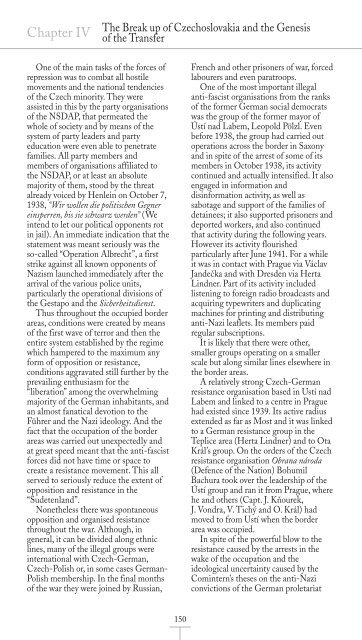the nationality of all inhabitants of the czech provinces and ...
the nationality of all inhabitants of the czech provinces and ...
the nationality of all inhabitants of the czech provinces and ...
Create successful ePaper yourself
Turn your PDF publications into a flip-book with our unique Google optimized e-Paper software.
Chapter IV<br />
One <strong>of</strong> <strong>the</strong> main tasks <strong>of</strong> <strong>the</strong> forces <strong>of</strong><br />
repression was to combat <strong>all</strong> hostile<br />
movements <strong>and</strong> <strong>the</strong> national tendencies<br />
<strong>of</strong> <strong>the</strong> Czech minority. They were<br />
assisted in this by <strong>the</strong> party organisations<br />
<strong>of</strong> <strong>the</strong> NSDAP, that permeated <strong>the</strong><br />
whole <strong>of</strong> society <strong>and</strong> by means <strong>of</strong> <strong>the</strong><br />
system <strong>of</strong> party leaders <strong>and</strong> party<br />
education were even able to penetrate<br />
families. All party members <strong>and</strong><br />
members <strong>of</strong> organisations affiliated to<br />
<strong>the</strong> NSDAP, or at least an absolute<br />
majority <strong>of</strong> <strong>the</strong>m, stood by <strong>the</strong> threat<br />
already voiced by Henlein on October 7,<br />
1938, “Wir wollen die politischen Gegner<br />
einsperren, bis sie schwarz werden” (We<br />
intend to let our political opponents rot<br />
in jail). An immediate indication that <strong>the</strong><br />
statement was meant seriously was <strong>the</strong><br />
so-c<strong>all</strong>ed “Operation Albrecht”, a first<br />
strike against <strong>all</strong> known opponents <strong>of</strong><br />
Nazism launched immediately after <strong>the</strong><br />
arrival <strong>of</strong> <strong>the</strong> various police units,<br />
particularly <strong>the</strong> operational divisions <strong>of</strong><br />
<strong>the</strong> Gestapo <strong>and</strong> <strong>the</strong> Sicherheitsdienst.<br />
Thus throughout <strong>the</strong> occupied border<br />
areas, conditions were created by means<br />
<strong>of</strong> <strong>the</strong> first wave <strong>of</strong> terror <strong>and</strong> <strong>the</strong>n <strong>the</strong><br />
entire system established by <strong>the</strong> regime<br />
which hampered to <strong>the</strong> maximum any<br />
form <strong>of</strong> opposition or resistance,<br />
conditions aggravated still fur<strong>the</strong>r by <strong>the</strong><br />
prevailing enthusiasm for <strong>the</strong><br />
“liberation” among <strong>the</strong> overwhelming<br />
majority <strong>of</strong> <strong>the</strong> German <strong>inhabitants</strong>, <strong>and</strong><br />
an almost fanatical devotion to <strong>the</strong><br />
Führer <strong>and</strong> <strong>the</strong> Nazi ideology. And <strong>the</strong><br />
fact that <strong>the</strong> occupation <strong>of</strong> <strong>the</strong> border<br />
areas was carried out unexpectedly <strong>and</strong><br />
at great speed meant that <strong>the</strong> anti-fascist<br />
forces did not have time or space to<br />
create a resistance movement. This <strong>all</strong><br />
served to seriously reduce <strong>the</strong> extent <strong>of</strong><br />
opposition <strong>and</strong> resistance in <strong>the</strong><br />
“Sudetenl<strong>and</strong>”.<br />
None<strong>the</strong>less <strong>the</strong>re was spontaneous<br />
opposition <strong>and</strong> organised resistance<br />
throughout <strong>the</strong> war. Although, in<br />
general, it can be divided along ethnic<br />
lines, many <strong>of</strong> <strong>the</strong> illegal groups were<br />
international with Czech-German,<br />
Czech-Polish or, in some cases German-<br />
Polish membership. In <strong>the</strong> final months<br />
<strong>of</strong> <strong>the</strong> war <strong>the</strong>y were joined by Russian,<br />
The Break up <strong>of</strong> Czechoslovakia <strong>and</strong> <strong>the</strong> Genesis<br />
<strong>of</strong> <strong>the</strong> Transfer<br />
150<br />
French <strong>and</strong> o<strong>the</strong>r prisoners <strong>of</strong> war, forced<br />
labourers <strong>and</strong> even paratroops.<br />
One <strong>of</strong> <strong>the</strong> most important illegal<br />
anti-fascist organisations from <strong>the</strong> ranks<br />
<strong>of</strong> <strong>the</strong> former German social democrats<br />
was <strong>the</strong> group <strong>of</strong> <strong>the</strong> former mayor <strong>of</strong><br />
Ústí nad Labem, Leopold Pölzl. Even<br />
before 1938, <strong>the</strong> group had carried out<br />
operations across <strong>the</strong> border in Saxony<br />
<strong>and</strong> in spite <strong>of</strong> <strong>the</strong> arrest <strong>of</strong> some <strong>of</strong> its<br />
members in October 1938, its activity<br />
continued <strong>and</strong> actu<strong>all</strong>y intensified. It also<br />
engaged in information <strong>and</strong><br />
disinformation activity, as well as<br />
sabotage <strong>and</strong> support <strong>of</strong> <strong>the</strong> families <strong>of</strong><br />
detainees; it also supported prisoners <strong>and</strong><br />
deported workers, <strong>and</strong> also continued<br />
that activity during <strong>the</strong> following years.<br />
However its activity flourished<br />
particularly after June 1941. For a while<br />
it was in contact with Prague via Václav<br />
J<strong>and</strong>ečka <strong>and</strong> with Dresden via Herta<br />
Lindner. Part <strong>of</strong> its activity included<br />
listening to foreign radio broadcasts <strong>and</strong><br />
acquiring typewriters <strong>and</strong> duplicating<br />
machines for printing <strong>and</strong> distributing<br />
anti-Nazi leaflets. Its members paid<br />
regular subscriptions.<br />
It is likely that <strong>the</strong>re were o<strong>the</strong>r,<br />
sm<strong>all</strong>er groups operating on a sm<strong>all</strong>er<br />
scale but along similar lines elsewhere in<br />
<strong>the</strong> border areas.<br />
A relatively strong Czech-German<br />
resistance organisation based in Ustí nad<br />
Labem <strong>and</strong> linked to a centre in Prague<br />
had existed since 1939. Its active radius<br />
extended as far as Most <strong>and</strong> it was linked<br />
to a German resistance group in <strong>the</strong><br />
Teplice area (Herta Lindner) <strong>and</strong> to Ota<br />
Král’s group. On <strong>the</strong> orders <strong>of</strong> <strong>the</strong> Czech<br />
resistance organisation Obrana národa<br />
(Defence <strong>of</strong> <strong>the</strong> Nation) Bohumil<br />
Bachura took over <strong>the</strong> leadership <strong>of</strong> <strong>the</strong><br />
Ústí group <strong>and</strong> ran it from Prague, where<br />
he <strong>and</strong> o<strong>the</strong>rs (Capt. J. Kňourek,<br />
J. Vondra, V. Tichý <strong>and</strong> O. Král) had<br />
moved to from Ustí when <strong>the</strong> border<br />
area was occupied.<br />
In spite <strong>of</strong> <strong>the</strong> powerful blow to <strong>the</strong><br />
resistance caused by <strong>the</strong> arrests in <strong>the</strong><br />
wake <strong>of</strong> <strong>the</strong> occupation <strong>and</strong> <strong>the</strong><br />
ideological uncertainty caused by <strong>the</strong><br />
Comintern’s <strong>the</strong>ses on <strong>the</strong> anti-Nazi<br />
convictions <strong>of</strong> <strong>the</strong> German proletariat


